Clifford Garstang's Blog, page 118
October 30, 2011
Block the Internet
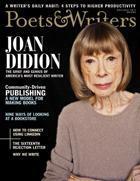 The blogpost title is ironic, right? If you block the internet, you can't read the blogpost. Nonetheless, it's good advice.
The blogpost title is ironic, right? If you block the internet, you can't read the blogpost. Nonetheless, it's good advice.I'm making my way through the new issue of Poets & Writers, which seems to have more good stuff in than usual, which is saying something, because it's usually filled with useful and/or interesting articles. This time, there's fodder for several blogposts, but I'm going to start with one that really hit home.
Novelist Ellen Sussman's article, "A Writer's Daily Habit: Four Steps to Higher Productivity," is straightforward, relevant to most writers I know, and easily implementable. The 4 steps? The first is "Prewriting Prep"--meditation. I would suggest that there are other ways to clear the mind in order to prepare for the work ahead, but meditation works. Next is "Block the Internet"--and I couldn't agree more. Sussman even recommends the Freedom software program that I've been using lately, because apparently her willpower is no stronger than mine. I'm so pleased to see that another writer--a successful writer--relies on this program. Next is Sussman's "Unit System"--and I'm not quite as sold on this one. In essence, she divides her writing time into one hour blocks but spends the last 15 minutes of each hour on a break, whether it's beginning the laundry or dinner or taking the dog out, or whatever. She's still writing during that time--her mind is still on the work--but it has a restorative effect that allows her to return to the desk with new energy when the next unit begins. Finally, she recommends "Daily Writing"--which doesn't need explanation. I completely agree with this one, too, especially for longer projects where it's important to keep it all in your head. If you take too much time away from it, don't be surprised if you end up with loose ends and dropped threads.
More on this issue in the coming week.
Published on October 30, 2011 07:35
October 29, 2011
The New Yorker: Keep or Throw Away?
 A reader of my New Yorker Fiction Commentaries writes:
A reader of my New Yorker Fiction Commentaries writes:I have a question which might not deal directly - but certainly indirectly - with this post. I've been subscribing to the NY for the past 4-5 years. I keep all my issues. Which is to say that by now I have two boxes full. I kind of want to get rid of them. Just wondering what other readers do? Maybe I'm just a packrat and throwing them away is no big deal?We'd love to hear your comments on this. Here's my answer, though. Donate them if you can, recycle them if you can't. When I subscribed to the paper magazine, I recycled them when if finished with them. That was one reason I started my weekly commentary, just so I'd force myself to read the magazine every week. Especially now that subscribers have access to the online archive, I don't see any real reason to hang on to the artifacts. Spread the wealth, one way or another. (My subscription now is on my Kindle, and for a while I was keeping all of the past copies, even those I'd read, but I don't even do that anymore.)
I'd be interested in hearing from you and your readers, or seeing some poll - throw away or keep?
Is there any advantage to keeping these issues or am I just wasting time/space?
Published on October 29, 2011 08:04
October 28, 2011
Tips for Writers: Get to Know Your Characters
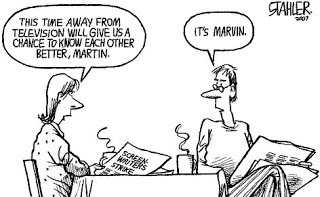 Recently, I had a guest post gig on Dixon Rice's blog for his "Top O'Day for Authors" series: What are the stakes? My point was, in other words, it's essential for a writer to know what's at risk for his characters. Or, as Ellen Meister puts it in her own "Writing Tip" series this morning, What does your main character want? These are fundamental questions that a fiction writer must address in order to create material on the page that will engage readers.
Recently, I had a guest post gig on Dixon Rice's blog for his "Top O'Day for Authors" series: What are the stakes? My point was, in other words, it's essential for a writer to know what's at risk for his characters. Or, as Ellen Meister puts it in her own "Writing Tip" series this morning, What does your main character want? These are fundamental questions that a fiction writer must address in order to create material on the page that will engage readers.But in order to answer these questions, you have to get to know your characters. As I am embarking on a new book--I reserved this week for outlining and research--I am also beginning to understand (or try to understand) my new protagonist and the people around her. To that end, I am filling out a character questionnaire that I created. (I adapted mine from a couple of different sources, and you may want to do the same. Here's a relative short example: character questionnaire, but I would recommend going into even greater depth.). By the time I'm finished, I'll know just about everything about Kate (that's her name, for the moment): favorite foods, sexual proclivities, religious convictions (and any other kind of convictions, misdemeanors or otherwise!), education, eye color, best friend, embarrassing moments, political leanings, profession, grades in school, the sorority she belonged to (yes, I think she joined a sorority, possibly Tri-Delt), and so on. It's an extensive list of questions and it's going to take a lot of time and thought for me to do it (which is why I'm stalling by writing this blog post).
If I'm going to understand what she wants, however, I've got to put in that effort now. In the long run, it will pay off. (The same goes for the other main characters, by the way, especially the two men in Kate's life. Did I say "two?" Hmm. Interesting.) So, here goes. Let's see, she's how tall? Hair color? . . . .
Published on October 28, 2011 06:32
October 26, 2011
Exploring Scrivener for Windows
 With one book being edited by a publisher and another being scrutinized by my agent, I need to be working on something, so I'm embarking on a new book project, one that I've been thinking about for a while. In my head, at least, it's a jumble of past and present, part historical, part contemporary, and that's going to involve two story lines plus two casts of characters. Complicated. So it struck me that I need to be a bit more organized as I approach this one than I was the last one.
With one book being edited by a publisher and another being scrutinized by my agent, I need to be working on something, so I'm embarking on a new book project, one that I've been thinking about for a while. In my head, at least, it's a jumble of past and present, part historical, part contemporary, and that's going to involve two story lines plus two casts of characters. Complicated. So it struck me that I need to be a bit more organized as I approach this one than I was the last one.Enter Scrivener for Windows, a program that I think is going to be a big help. I've done a preliminary outline with sketches of what each chapter will contain. I've done a list of characters for each of the two threads (color coded!) and have begun sketches for each of the characters. I've been doing research on the setting and history of the story's primary location, and have taken notes. And all of that is in easy-to-manage files within the program. I've even started finding photos of my characters and have pasted them into the program. I like the idea of being able to see pictures of the characters on the screen while I'm writing.
One thing I think I'm really going to like is the notecard feature. Right now each of my chapters has a notecard (or cluster of notecards) and they are tacked to a corkboard screen. The cards are color coded depending on whether the chapter takes place in the past or the present. But because I'm not sure yet in what sequence I want the chapters to appear, I'm especially pleased that I can move TEXT around by simply reordering the cards. Eventually, when I have things in the right order and have written all the chapters, I can export the text to a Word file for further processing and formatting. But I envision that being a fairly late stage of the game.
Scrivener for Windows is currently in Beta. It's release is supposed to be sometime in November, at which point I'll need to buy the program, but I think it will be worth it.
Published on October 26, 2011 19:24
October 24, 2011
The New Yorker: "Tenth of December" by George Saunders
[image error]
October 31, 2011: "Tenth of December" by George Saunders
This story is typical Saunders—funny and touching at thesame time—with a Joycean epiphany at the end. And although it's supposed to bebehind the paywall, when I clicked on the link the whole story showed up, soyou might be in luck.
Saunders gives us the odd voices of two odd characters, bothof whom also hear voices. We get young Robin, an overweight kid with away-overactive imagination, on his way to the pond in the park to do battlewith the Nethers, tiny creatures who live in a stone wall and who might havekidnapped the girl he has a crush on who thinks his name is Roger. Also in thepark is Donald Eber, a brain-cancer patient who is considering drowning himselfin order to end the burden that he has become on his wife and kids.
Meanwhile, Robin discovers Eber's abandoned coat—abandonmentis a theme here—and sees the older man by the pond. So he picks up the coat andinstead of going around the pond, he decides to take a shortcut across the ice.Uh oh. Bad idea. It's not hard to guess what happens next, or what happensafter that, or how—given that I've mentioned that epiphany—how the story ends.
So it's not exactly a surprising story, and I'm not a bigfan of the epiphany in modern stories, but the story is still enjoyable becauseof those two whacked-out voices.
Also, check out the Q&A with George Saunders.
October 31, 2011: "Tenth of December" by George Saunders
This story is typical Saunders—funny and touching at thesame time—with a Joycean epiphany at the end. And although it's supposed to bebehind the paywall, when I clicked on the link the whole story showed up, soyou might be in luck.
Saunders gives us the odd voices of two odd characters, bothof whom also hear voices. We get young Robin, an overweight kid with away-overactive imagination, on his way to the pond in the park to do battlewith the Nethers, tiny creatures who live in a stone wall and who might havekidnapped the girl he has a crush on who thinks his name is Roger. Also in thepark is Donald Eber, a brain-cancer patient who is considering drowning himselfin order to end the burden that he has become on his wife and kids.
Meanwhile, Robin discovers Eber's abandoned coat—abandonmentis a theme here—and sees the older man by the pond. So he picks up the coat andinstead of going around the pond, he decides to take a shortcut across the ice.Uh oh. Bad idea. It's not hard to guess what happens next, or what happensafter that, or how—given that I've mentioned that epiphany—how the story ends.
So it's not exactly a surprising story, and I'm not a bigfan of the epiphany in modern stories, but the story is still enjoyable becauseof those two whacked-out voices.
Also, check out the Q&A with George Saunders.
Published on October 24, 2011 16:14
Meta Blogging: Pushcart Prize Ranking
 Today, Brevity's Nonfiction Blog has a guest post by yours truly that Dinty Moore calls Which Magazines Earn the Most Pushcart Prizes in Nonfiction? The post is a brief discussion of the latest wrinkle in my rankings of literary magazines based on the number of Pushcart Prizes and Special Mentions earned each year over a ten year period. The list began several years ago as a ranking for fiction. Brevity got interested when I recently created a new list for nonfiction. Anyway, you can go there, read all about it, and follow the links back here . . .
Today, Brevity's Nonfiction Blog has a guest post by yours truly that Dinty Moore calls Which Magazines Earn the Most Pushcart Prizes in Nonfiction? The post is a brief discussion of the latest wrinkle in my rankings of literary magazines based on the number of Pushcart Prizes and Special Mentions earned each year over a ten year period. The list began several years ago as a ranking for fiction. Brevity got interested when I recently created a new list for nonfiction. Anyway, you can go there, read all about it, and follow the links back here . . .
Published on October 24, 2011 10:27
October 21, 2011
Tips for Writers: How to Publish A Short Story Collection
 A friend of mine asked me recently if I'd written a blogpost on the subject of getting a short story collection published. I don'tthink I have, at least not one with much detail, so it seemed like a goodsubject for Tips for Writers.
A friend of mine asked me recently if I'd written a blogpost on the subject of getting a short story collection published. I don'tthink I have, at least not one with much detail, so it seemed like a goodsubject for Tips for Writers.Let's assume that you've got a collection finished. Let'salso assume that you'd like the book published in the most prestigious place,with the most exposure and the most money for you. That would be one of themajor trade publishers like Simon & Schuster or Random House. The majorpublishers do take on short story collections from time to time if they thinkthey can sell them to the public—the author is a big name, the house is alsopublishing that writer's novel, there is some other buzz about the book or theauthor. But these publishers are of the opinion that the reading public doesn'tbuy story collections, and they may be right about that. So this ambition is along shot, and your chances of succeeding are enhanced if you've also got anovel to sell. In any event, the first step on this road is finding an agent,because major publishers won't deal with anyone but agents, who have become thegatekeepers for the industry.
Getting an agent is a whole story unto itself, and it isn'teasy. I did manage to get an agent for a story collection. She thought the bookwas just distinct enough (I call it a novel in stories) that a publisher mighttake an interest; she loved it and thought they would, too. But they didn't, ordidn't love it enough to publish it. After two years of trying—all the majorpublishers and most of the next tier—she basically gave up.
So if you can't get an agent or if your agent can't sell thebook to the big publishers, you're left with independent, university, and smallpresses. And there are lots and lots of these presses. Finding one to publishyour book is very similar to the agent search. You send out queries, sometimeswith samples, sometimes without, and then you wait. You hope that someone willrequest a full manuscript, and then you wait some more. Someone makes an offer(you hope), and then you let the other publishers know about it and see ifsomeone will make a better offer.
Until those other offers come in, though, you can alsosubmit the manuscript to contests. There are a lot of these contests, such asthe Iowa Short Fiction Contest and the Flannery O'Connor, but the competitionis very tough because there are a lot of writers with story collectionmanuscripts.But then, if you're persistent and your book is good, youwill eventually find a small press to take your collection.
This is essentially the path I followed—twice. With my firstcollection, In an Uncharted Country, I didn't try very hard to get an agentbecause I knew that my book was unlikely to be attractive to bigger publishers.It's a pretty quiet book and my publication credits (11 of the 12 stories hadbeen published in magazines) were rather obscure. So, after a few rejectionsfrom agents (many of whom said, "Do you have a novel?"), I started submittingto small presses. It didn't take long for Press 53 to ask for the book, andbecause they are committed to publishing short story collections I was veryhappy with them. The second book, my novel in stories, What the Zhang Boys Know,I thought had a chance with bigger publishers because (a) I called it a novelin stories and (b) the stories were better. And, in fact, the big houses tookit seriously, but most of our rejections mentioned the fact that storycollections were a tough sell, as if I didn't know that already. In the end,though, I submitted to contests and small presses, and once again Press 53 wasenthusiastic about the book. So it's coming out from them in September 2012.I'm happy about that, and now I can turn my attention to the next book.
If you don't find a publisher, you still have the option ofself-publishing, which is getting easier to do all the time, and if you chooseto make it an eBook instead of a print book, the costs of this approach arefew. I don't recommend this route if you want to have a career as a fictionwriter, however. Keep looking for a traditional publisher, even a very smallone.
Published on October 21, 2011 10:17
October 20, 2011
2011 Nonfiction Pushcart Prize Ranking
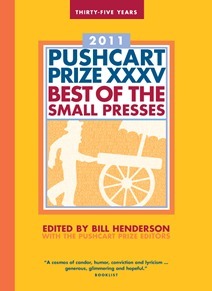 I am pleased to present the complete 2011 Nonfiction Pushcart Prize Ranking. This list, like the fiction list, which you can find here, is simple and objective. It covers ten years of Pushcart Prize anthologies and is based on a formula that awards points for Special Mentions and more points for Prizes. I use the Pushcart Prize for these rankings because the volume draws from a broad representation of the literary magazine world (although, unfortunately, with less regard than is warranted for online publications). I do not consider any other factors--circulation, payment, reputation--in this list.
I am pleased to present the complete 2011 Nonfiction Pushcart Prize Ranking. This list, like the fiction list, which you can find here, is simple and objective. It covers ten years of Pushcart Prize anthologies and is based on a formula that awards points for Special Mentions and more points for Prizes. I use the Pushcart Prize for these rankings because the volume draws from a broad representation of the literary magazine world (although, unfortunately, with less regard than is warranted for online publications). I do not consider any other factors--circulation, payment, reputation--in this list.I initially created the fiction list in order to aid my own submission strategy (submitting within tiers) and I've heard from readers that many do the same. There are other rankings out in the world that purport to do more than mine does, and that's great. Here's the list. Do with it what you will.
[Note that magazines that are closed are marked with (c). Magazines for which I have no information are marked with a question mark.]
2011 Magazine 2011 Score 1 Georgia Review 70 2 Orion 56 3 Agni 41 4 Fourth Genre 39 5 Gettysburg Review 37 5 Threepenny Review 37 7 Conjunctions 36 8 American Scholar 35 9 Sun 34 10 Iowa Review 30 11 New Letters 28 12 Missouri Review 26 13 Creative Nonfiction 25 13 Southern Review 25 15 Tin House 21 16 Hudson Review 20 16 Raritan 20 16 Shenandoah 20 19 River Teeth 17 20 Ploughshares 16 21 Brain, Child 15 21 Image 15 21 Michigan Quarterly Review 15 21 Salmagundi 15 21 Virginia Quarterly Review 15 26 Antioch Review 14 26 Colorado Review 14 26 Kenyon Review 14 29 Paris Review 13 30 Bellevue Literary Review 12 31 Boulevard 11 31 Ecotone 11 31 Poetry 11 31 Speakeasy © 11 31 Third Coast 11 31 Witness 11 36 Five Points 10 36 TriQuarterly 10 36 ZYZZYVA 10 40 Ninth Letter 8 40 Northwest Review 8 40 Southwest Review 8 43 American Poetry Review 7 43 Harvard Review 7 43 New England Review 7 43 The Journal 7 43 Water-Stone Review 7 48 n+1 6 48 Palo Alto Review ? 6 48 Passages North 6 48 Pleiades 6 52 Arts & Letters 5 52 Fugue 5 52 Great River Review 5 52 In Character © 5 52 Massachusetts Review 5 52 North Dakota Quarterly 5 52 Oregon Humanities 5 52 Republic of Letters 5 52 Shearsman 5 52 The Point 5 52 Yale Italian Poetry 5 52 Zoetrope: All Story 5 64 Doubletake © 4 64 Parnassus 4 64 Sewanee Review 4 67 Alimentum 3 67 Fiction International 3 67 Gulf Coast 3 67 Hunger Mountain 3 67 Kyoto Journal 3 67 Manoa 3 67 North American Review 3 67 Post Road 3 67 World Literature Today 3 67 Yale Review 3 77 A Public Space 2 77 Alaska Quarterly Review 2 77 Another Chicago Magazine 2 77 Ascent 2 77 Asian American Writers Workshop 2 77 Believer 2 77 Bellevue Literary Press 2 77 Bellingham Review 2 77 Blackbird 2 77 Boston Review 2 77 Columbia Review 2 77 Connecticut Review 2 77 Florida Review 2 77 Hollins Critic 2 77 Hotel Amerika 2 77 Lapham's Quarterly 2 77 Narrative 2 77 Noon 2 77 Northern Lights (?) 2 77 Oxford American 2 77 Partisan Review © 2 77 PMS 2 77 Provincetown Arts 2 77 Rain Taxi 2 77 Santa Monica Review 2 77 Writers Chronicle 2 103 42 Opus 1 103 American Interest 1 103 American Letters & Commentary 1 103 American Short Fiction 1 103 Arkansas Review 1 103 Asia Literary Review 1 103 Baffler 1 103 Bat City 1 103 Black Pearls 1 103 Blood Orange Review 1 103 Bomb 1 103 Brick 1 103 Callaloo 1 103 Canteen 1 103 Chautauqua 1 103 Chicago Review 1 103 Cimarron Review 1 103 Confrontation 1 103 Crazyhorse 1 103 Denver Quarterly 1 103 Divide ? 1 103 Epoch 1 103 Europa Editions 1 103 Event 1 103 Fiction 1 103 FreshYarn.com 1 103 Graywolf Press 1 103 Haystack Mountain 1 103 Healing Muse 1 103 High Country News 1 103 Idaho Review 1 103 Indiana University Press 1 103 Iron Horse Literary Review 1 103 Island ? 1 103 James White Review ? 1 103 Lit 1 103 Literary Imagination 1 103 Literary Review 1 103 Make ? 1 103 Marginalia © 1 103 Memoir 1 103 Meridian 1 103 Milkweed Editions - Press 1 103 Minnesota Review 1 103 New Haven Review 1 103 New Ohio Review 1 103 On the Page 1 103 Ontario Review © 1 103 Open City 1 103 Open Spaces 1 103 Other Voices © 1 103 Pen America 1 103 Portland Magazine 1 103 Portland Review 1 103 Prairie Schooner 1 103 Prism 1 103 Relief 1 103 River City Publishing 1 103 River Styx 1 103 Rosebud 1 103 Rumpus 1 103 Seneca Review 1 103 SN Review 1 103 Southampton Review 1 103 Stone Canoe 1 103 Stranger 1 103 Subtropics 1 103 Tiferet 1 103 Under the Sun 1 103 University of Notre Dame Press 1 103 Vocabula Bound 1 103 Wag's Revue 1 103 War, Literature and The Arts 1 103 Weber Studies 1 103 Western Humanities Review 1 103 Willow Springs 1
Published on October 20, 2011 12:43
October 19, 2011
National Book Award Brouhaha
[image error]
Book people have no doubt heard about the mess in the YA category for the National Book Awards. Initially, a book was mistakenly included in the short list because its title was close to the actual nominee. The mistake was corrected--after the announcements were made--but that meant Lauren Myracle and her book Shine had to step aside. That's probably not been very fun for her, but it seems as though it might still translate into book sales, so there's consolation in that.
But it's not all bad news coming from the YA category judges. Here's an interesting blog post from Nikki Grimes, one of those judges, saying some very nice things about my friend Carol Saller's book, Eddie's War--one of her favorites of the year in addition to the five (six?) finalists:

But it's not all bad news coming from the YA category judges. Here's an interesting blog post from Nikki Grimes, one of those judges, saying some very nice things about my friend Carol Saller's book, Eddie's War--one of her favorites of the year in addition to the five (six?) finalists:
"Eddie's War by Carol Fisher Saller shows us the impact of WWII on a farm boy in the Heartland. True and tender."Readers may remember that I reviewed the book here. It was also reviewed in Prime Number Magazine, here. So, not quite an NBA finalist, but almost--and Carol and her book deserve to be recognized.
Published on October 19, 2011 15:06
Currently Reading . . .
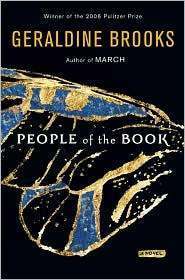 If you look at my Goodreads page, I'm currently reading more than 10 books. That's not really true, though. Some of those books I started and will get back to. Some are for research and I'll digest them slowly. Some of those . . . I've put back on the shelf and may or may not continue.
If you look at my Goodreads page, I'm currently reading more than 10 books. That's not really true, though. Some of those books I started and will get back to. Some are for research and I'll digest them slowly. Some of those . . . I've put back on the shelf and may or may not continue.But here's what I really am reading: People of the Book by Geraldine Brooks. It's quite a good story that matches my own distractedness by skipping around from the present-day story of Hanna the book conservator to the various stories of the people who have handled the book over the last several centuries. I heard Brooks speak at a conference a few years ago and meant to get to this book before now . . .
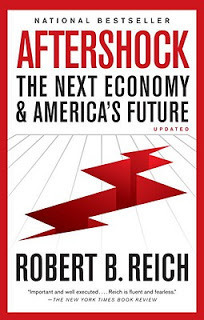 And I'm also reading Aftershock by Robert Reich for my Reading Liberally group. I've always liked Reich, and this is a clear presentation of the biggest flaw in our economy currently. Great analysis. I haven't made it to his prescription for solving the problem yet, but I hope he has one. And I hope someone listens to him.
And I'm also reading Aftershock by Robert Reich for my Reading Liberally group. I've always liked Reich, and this is a clear presentation of the biggest flaw in our economy currently. Great analysis. I haven't made it to his prescription for solving the problem yet, but I hope he has one. And I hope someone listens to him.
Published on October 19, 2011 11:24



